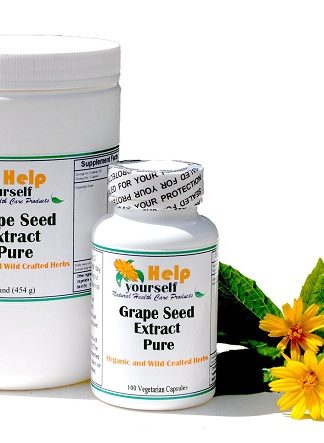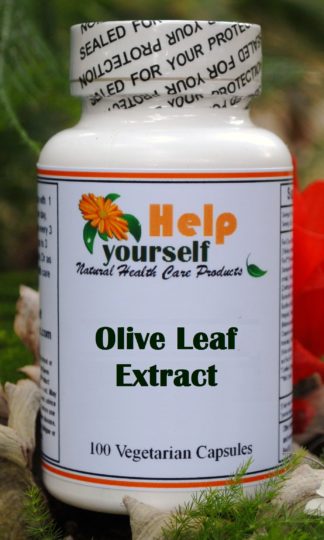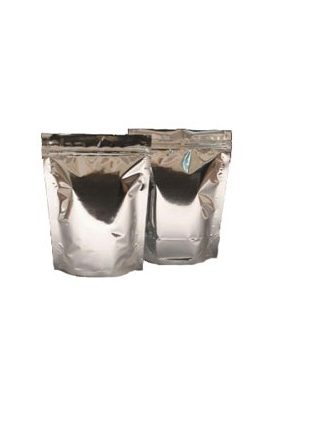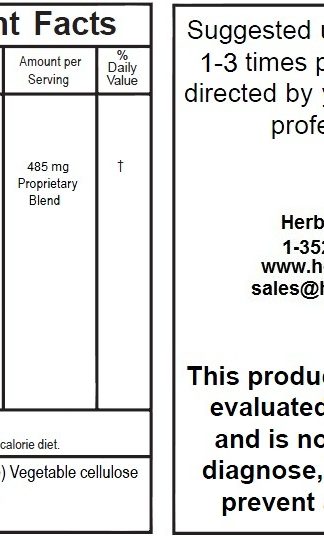Description
Powerful 95%+ Oligomeric Procyanidolic Complexes(OPC)
SUPER ANTIOXIDANT – 20-50 TIMES MORE POWERFUL THAN VITAMIN C, E, & BETA CAROTENE
Grape Seed Extract has been known to exhibit the following benefits: Anti-inflammatory (reduces swelling), Antihistamine, Antiallergenic, Antioxidant (free radical scavenger), Helps Skin to Remain Young Looking, Improves Circulation, Promotes Healing, Restores Collagen, Strengthens Weak Blood Vessels, Tissue Elasticity
Some known applications are: Arthritis, Allergies, Hardening of Arteries, Ulcers, Skin Problems and more
Grape seed extract is the primary commercial source of a group of powerful antioxidants known as oligomeric proanthocyanidins (OPCs), also generically called pycnogenol, a class of flavonoids. Laboratory studies have indicated OPCs are much more effective than vitamin C and vitamin E in neutralizing free oxygen radicals, which contribute to organ degeneration and aging in humans. The primary sources of OPCs are pine bark extract and grape seed extract. However, the grape seed extract is more widely recommended for its lower cost and because it contains an antioxidant not found in pine bark. Researchers have discovered that Grape Seed Extract can help defeat the hormone dihydrotestosterone (DHT) which stops the hair follicle growth cycle. Grape Seed Extract can help stimulate healthy hair growth. The active plant constituents in Grape Seed Extract are proanthocyanidins (OPC).
General use
Grape seed extract is a mixture of complex compounds and has a wide range of therapeutic uses, from preventing cancer and cardiovascular disease to alleviating symptoms of allergies, ulcers, and cataracts. Its antioxidant properties are believed to help slow the aging process. Procyanidins, a group of compounds found in the extract, are thought to increase the effectiveness of other antioxidants, especially vitamin C and vitamin E, by helping them regenerate after neutralizing free radicals in the blood and tissue. OPCs in the extract are watersoluble, making them easily absorbed by the body. They also are able to cross the stubborn blood-brain barrier, providing antioxidant protection to the brain and nervous system. Most of the research on grape seed extract has been done in Europe , so many of its reported benefits have not been reviewed or approved by the U.S. Food and Drug Administration. It is available as an over-the-counter supplement. According to Varro E. Tyler , dean emeritus of the Purdue University School of Pharmacy and Pharmacal Sciences, the procyanidin compounds found in grape seed extract are useful in treating vascular disorders They are also antioxidants, or free-radical scavengers, that help prevent some age-related cancers and atherosclerosis. Grape seed extract is a relatively new supplement in the United States , although it has been used in Europe for several decades. Its antioxidant properties were realized in the 1980s with the so-called French paradox, in which researchers discovered that the French had low rates of heart disease even though their diet was high in cholesterol. This was credited to their widespread consumption of red wine. Further research led to the OPCs concentrated in grape seeds.
Cardiovascular disease
European studies have shown procyanidins to be useful in treating blood vessel disorders, such as fragile capillaries and poor circulation in the veins. Components bind to the walls of the capillaries, making them less likely to break down with the effects of aging. In one European study, researchers found that treatment with grape seed extract quickly relieved a chronic condition of poor circulation in the veins. Grape seed extract has also been beneficial in treating edema, an excessive accumulation of fluid in tissue. Another use of grape seed extract is in reducing blood pressure in people with hypertension. A study published in 1998 by cardiovascular researchers at the University of California , Davis , found that flavonoids found in the extract helped increase flow in blood vessels, contributing to better regulation of blood pressure.
Cancer
A study published in 1998 by a team of researchers at Creighton University , Georgetown University Medical Center , and the University of Nebraska at Omaha , reported that grape seed extract significantly inhibited and sometimes killed human cancer cells, while promoting the growth of normal healthy cells. The extract was effective in killing 34-48% of breast, lung, and stomach cancer cells. It was not effective in destroying leukemia cells. Other studied have shown grape seed extract, combined with other antioxidants, can reduce the overall risk of developing cancer.
Respiratory conditions
Grape seed extract has been found to be beneficial in treating several respiratory conditions, including asthma, emphysema, allergies, and sinusitis. Pycnogenol helps inhibit the production of histamines, which decreases sensitivity to pollens and food allergens, thereby reducing allergic reactions.
Other conditions
OPCs in grape seed extract have shown effectiveness in treating a variety of other conditions. As an anti-inflammatory, it helps prevent swelling of joints, heals damaged tissue, and eases pain in people with arthritis. Studies have shown OPCs can stop cataract progression, treat and prevent glaucoma, and aid in treating several types of retinal disease. One of the extract’s most popular uses is in treating the affects of aging, including preventing wrinkles by protecting the skin against ultraviolet radiation damage from sunburn, improving skin elasticity and tone, and helping reduce the appearance of scars and stretch marks. There is a wide range of anecdotal reports of grape seed extract helping treat or reduce the effects of headaches, hemorrhoids, diabetes, prostate enlargement, and cellulite, although no clinical research supports these claims.
Preparations
Grape seed extract is generally available in 50 mg (milligram) and 100 mg capsules. The acceptable adult daily dosage is 150-200 mg, or 50 mg per 50 lb (22.7 kg) of body weight. In Europe , OPCs are usually prescribed at 300 mg a day to treat medical conditions such as varicose veins, edema, allergies, inflammation, and skin aging. The extract contains varying amounts of proanthocyanics, although this is usually 80-95%. Research in the United States and Europe has shown it is most effective when used in combination with other antioxidants, especially vitamin C and vitamin E. Grape seed extract is fully absorbed by the body within one hour after consumption. One-half the original dose is still functional within the body after seven hours.
Precautions
There are no known precautions associated with grape seed extract. However, persons with serious conditions such as cancer, diabetes, and cardiovascular disease should not substitute grape seed extract for their existing treatments without first consulting with their doctor. There is no clinical evidence that grape seed extract can cure any of these conditions. Since grape seed extract is watersoluble, any excess intake that is not used by the body is eliminated in the urine. Studies have shown it is not carcinogenic, does not cause birth defects, and does not cause cells to mutate.
Side effects
Nausea and upset stomach have been reported on occasion. More rarely, allergic reactions in the form of temporary skin rashes have occurred in persons sensitive to grape products. There are no reported serious side effects associated with taking grape seed extract. It is non-toxic, even at high dosages.
Interactions
There are no reported negative interactions associated with grape seed extract. However, several studies done in the United States and Europe show the extract has a positive reaction with vitamin C and vitamin E. Studies have shown that OPCs in grape seed extract are as much as 50 times more potent than those in vitamin E and up to 20 times more potent than OPCs in vitamin C.
No therapeutic claims are made or implied.
Best By: Our Herbal Formulas and Herbs have a 3-year expiration date. This is based on the date of manufacture.
Herbs do not spoil, but they do lose their strength.The degradation rate of herbs depends also on the storage conditions of the herb. Store Away From Heat, Light and Moisture.
* See Disclaimer section for additional information about this product






Reviews
There are no reviews yet.